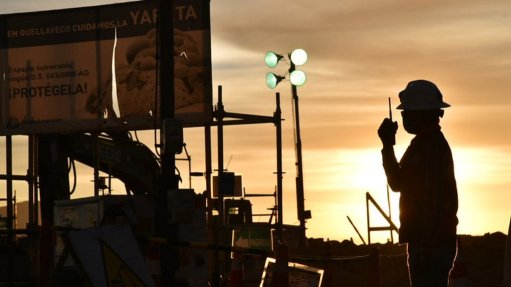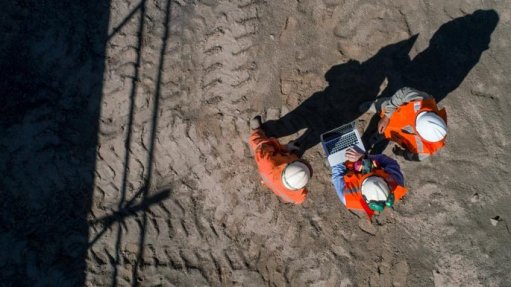Power shift in unions could mean a difficult time ahead in SA platinum belt
The Association of Mineworkers and Construction Union (AMCU) has replaced the National Union of Mineworkers (NUM) as the most popular union in the platinum mining belt and South African scrutineer the Bench Marks Foundation (BMF) says this new shift in power is going to present new challenges for platinum miners in the North West.
BMF executive director John Capel states that it seems that a comfortable relationship was developing between platinum miners and the NUM and he foresees more turmoil ahead while major platinum mining companies and AMCU are becoming familiar with each other.
“Our impression is that NUM started to lose contact with the needs of its members. That doesn’t mean that AMCU will be better, but workers have a democratic right to choose with whom they want to associate,” he says.
Capel adds that it is going to be a challenge to get used to AMCU as a new power in the platinum belt for mining companies as well as AMCU itself.
“AMCU has recorded phenomenal growth in a short period of time, and it will be interesting to see if it will be able to keep up with the demands that have been placed on it by the new memberships that will expect the union to deliver.
“I do not think the NUM will let go of lost membership easily, it will campaign to get that membership back,” he says, adding that he does not feel that centralised bargaining is the answer to the challenges the industry currently faces. These relate to growing inequalities and the working and living conditions of mineworkers.
“The challenges that we currently see in the industry are owing to the unions losing contact with the needs of their members,” he notes.
Lonmin
Last year, BMF nominated platinum miner Lonmin as the worst company of the year for the Public Eye Awards, which are a regular feature on the sidelines of the yearly World Economic Forum meeting in Davos, Switzerland.
“We were horrified at how they handled the strike incidents last year, when they refused to engage, negotiate and communicate with the rock drillers who were on strike,” notes Capel.
He states that since those violent strikes in August last year, BMF has engaged with Lonmin on challenges such as the living and housing conditions of workers in that area.
“Ten years ago, Lonmin’s hostels accommodated 20 000 workers. They have now started converting those hostels into single-quarter and family living units and can only accommodate 3 000 workers,” he says.
A spokesperson for Lonmin states that, as a company, Lonmin acknowledges many of the issues that Capel raises, and made it clear when the company met with him earlier this year that Lonmin is committed to working with all stakeholders to find ways to resolve them.
“Together with the hostel conversions, which will be completed in 2014, and other accommodation provided, approximately 4 000 units will be available to employees, not 300,” states a Lonmin spokesperson.
Capel points out that the rest of the workers receive living-out allowances and live in the informal settlements surrounding the mine.
“There are unintended consequences from the influx of mineworkers into these local communities, where there is a lack of housing, water and electricity,” he notes.
Capel explains that in Lonmin’s sustainability report of 2003, the company stated that it would provide proper housing for its employees by 2011.
“They have not been able to provide housing and, according to Lonmin, this is owing to land and structural problems, and the issue has not yet been resolved,” he says, adding that living-out allowances are not the answer.
“Challenges, such as access to clean running water and a proper sewage system, should be addressed urgently. All companies in the platinum mining belt say they will provide housing for their employees, but what they are actually doing is facilitating home loans for their workers.”
A Lonmin spokesperson points out that the company acknowledges that there have been unintended consequences of the living-out allowance and that this is something all stakeholders need to help address.
“Lonmin has commenced initiatives, in conjunction with the local authorities, to assist in providing better living conditions for the local communities, such as assisting with sanitation, water reticulation and refuse removal. For example, Lonmin manages the waste removal, sewage system and general maintenance of the town of Mooinooi, notwithstand- ing that this is the obligation of the local authority,” says the spokesperson.
Capel notes that many of the workers do not want home ownership in these areas – they have their own homes in other provinces.
“Mines need to look at some sort of rental accommodation and move away from ownership, as workers are resisting it,” he notes.
A Lonmin spokesperson, however, notes that companies on the platinum belt provide financial advice and assistance with loans and rent-to-buy options to encourage home ownership, and that the rental at Lonmin’s converted units is affordable, and has not increased for 5 years.
“It is available from as little as R350 a month for both family and single accommodation, including water, lights and transport. All of our hostel conversion units are rental only,” the spokesperson states.
Capel states that mining companies in the platinum belt need to communicate with communities about the negative impacts of mining and look at how they can turn some of these negative impacts into developmental opportunities such as job creation.
“Mining companies in that area must think outside the box. They operate in poor communities and the local employment of people in those communities is negligible,” he notes, adding that 90% of the workers employed by mines in the area comprise migrant labour.
“There are currently 150 000 migrant workers in the platinum industry. Government and local communities cannot cope with the social problems this creates. New thinking needs to take place within the platinum sector so that positive changes can be made,” he states.
A Lonmin spokesperson maintains that while the company does not have access to Capel’s statistics and cannot comment on other mines, it is a difficult statistic to prove and Lonmin is not aware of verifiable studies that have accurately come to this figure.
“As a company, Lonmin acknowledges many of the issues that Mr Capel raises, and as we made clear when the company met with him earlier this year, Lonmin is committed to working with all stakeholders to find ways to resolve them,” the spokesperson adds.
“Approximately 27% of grades 4 to 9 employees at Lonmin are from the North West province,” the spokesperson says.
Comments
Press Office
Announcements
What's On
Subscribe to improve your user experience...
Option 1 (equivalent of R125 a month):
Receive a weekly copy of Creamer Media's Engineering News & Mining Weekly magazine
(print copy for those in South Africa and e-magazine for those outside of South Africa)
Receive daily email newsletters
Access to full search results
Access archive of magazine back copies
Access to Projects in Progress
Access to ONE Research Report of your choice in PDF format
Option 2 (equivalent of R375 a month):
All benefits from Option 1
PLUS
Access to Creamer Media's Research Channel Africa for ALL Research Reports, in PDF format, on various industrial and mining sectors
including Electricity; Water; Energy Transition; Hydrogen; Roads, Rail and Ports; Coal; Gold; Platinum; Battery Metals; etc.
Already a subscriber?
Forgotten your password?
Receive weekly copy of Creamer Media's Engineering News & Mining Weekly magazine (print copy for those in South Africa and e-magazine for those outside of South Africa)
➕
Recieve daily email newsletters
➕
Access to full search results
➕
Access archive of magazine back copies
➕
Access to Projects in Progress
➕
Access to ONE Research Report of your choice in PDF format
RESEARCH CHANNEL AFRICA
R4500 (equivalent of R375 a month)
SUBSCRIBEAll benefits from Option 1
➕
Access to Creamer Media's Research Channel Africa for ALL Research Reports on various industrial and mining sectors, in PDF format, including on:
Electricity
➕
Water
➕
Energy Transition
➕
Hydrogen
➕
Roads, Rail and Ports
➕
Coal
➕
Gold
➕
Platinum
➕
Battery Metals
➕
etc.
Receive all benefits from Option 1 or Option 2 delivered to numerous people at your company
➕
Multiple User names and Passwords for simultaneous log-ins
➕
Intranet integration access to all in your organisation


















